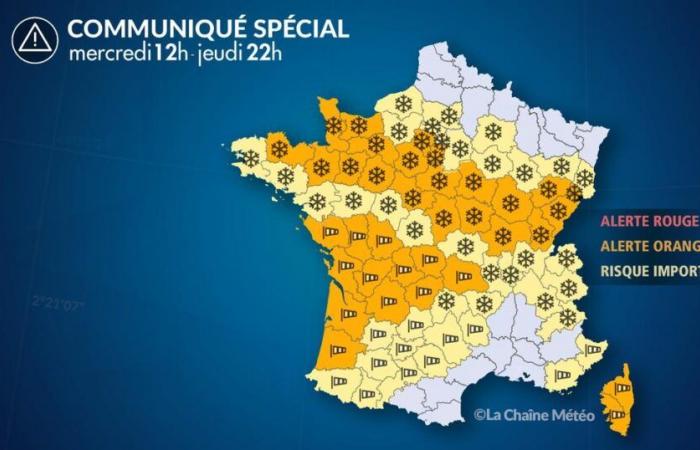Of
Wednesday November 20 at 12:00 au
Thursday November 21 at 10:00 p.m.
Situation
This Wednesday, the stormy wind episode persists until the early evening in Corsica and to a lesser extent in the Var.
On Thursday, a very hollow depression named Caetano arrives in Brittany in the morning and crosses France from west to east. It is associated with a major conflict between mild Atlantic air and much colder air present in the north of France. In contact with these two air masses, precipitation is intense and occurs in the form of snow from northern Brittany and Normandy to Burgundy-Franche-Comté, via Centre-Val de Loire, Ile-de-France and the south of the Grand Est region. Due to the intensity of precipitation and temperatures between 0 and 2°C, snow easily sticks to the ground on the plains and plateaus from 150 m altitude with 3 to 8 cm and locally 10 cm above 300 meters . Holding is more difficult in valleys and highly urbanized areas with 1 to 3 cm. This snow will often be accompanied by gusts of wind and traffic conditions may be difficult, particularly on the secondary network.
In connection with the passage of this depression, the wind blows strongly from the Atlantic coasts to the Massif Central with gusts of 100 to 120 km/h on the coast, locally 130 km/h and 90 to 110 km/h inland.
For the ORANGE alert, the wind continues to blow violently over the next few hours. Peak winds of 120 to 140 km/h are expected in Balagne, 130 to 160 km/h on Cap Corse, locally 180 km/h possible. On the southern end of the island, we expect 110 to 140 km/h in the Bonifacio sector. Finally, gusts will reach 120 to 150 km/h on the Corsican mountain crests.
For the Var and the Alpes-Maritimes placed on YELLOW alert, 100 to 110 km/h can be reached in eastern Provence and the reliefs of the Alpes-Maritimes and more locally on the French Riviera.
Observation
At 11 a.m., Wind gusts of 181 km/h were observed at Cap Sagrro, 127 km/h at Ile Rousse and 113 km/h at Dramont.
At 8 o'clockviolent gusts were observed in Haute-Corse with 176 km/h in Cagnano, 173 km/h in Cap Sagro, 135 km/h in Ile Rousse, 120 km/h in Oletta. In Corsica-du-Sud, we observed 100 km/h in Porto-Vecchio and 105 km/h in Cap Pertusato, 110 km/h in Conca. In the PACA region, we observed 107 km/h in Mas (06) and Peille (06), 108 km/h on the island of Levant (83), 113 km/h on the island of Porquerolles (83 ) and 124 km/h at Dramont (83). Note that during the night a maximum gust of 186 km/h was observed in Cagnano in Haute-Corse and a monthly wind record was broken in Nice with 105 km/h (old record 97 km/h in 2011) .
Evolution
This Wednesday
It is during the day on Wednesday that the wind will blow the most violently on the island with maximum gusts of 120 to 150 km/h on Balagne and in particular the Île Rousse sector. On Cap Corse, maximum gusts will reach 140 to 170 km/h and it is not excluded to have peaks at 180-200 km/h. The wind could surge in violent gusts of 90 to 120 km/h across the Bastia region. The wind will be particularly violent on the Corsican mountains with maximum gusts reaching 140 to 160 km/h. On the Bouches de Bonifacio, maximum gusts will be between 100 and 130 km/h.
The expected gusts will be less intense in Provence and the Nice hinterland, hence the IMPORTANT RISK level alert, with gusts of between 100 and 110 km/h.
SNOW ALERT
Thursday morning
The disturbance invades the western and northwestern part of the country. The snow falls moderately from the beginning of the morning from the north of Brittany to the north of the Pays de la Loire then strengthens over the hours, adding a few centimeters (3 to 6 cm) on the hills. The snow is more difficult to hold on the coast and in the heart of cities with 1 to 3cm. On the tip of Brittany and the south of Brittany and the Pays de la Loire, it is rain or mixed rain and snow. At the end of the morning, snow invades all of Lower Normandy and Center-Val de Loire up to the edge of Ile-de-France. The snow quickly sticks to the ground on the plateaus.
Snow is often accompanied by strong gusts of wind and makes driving conditions difficult in places exposed to the northeast wind.
Thursday afternoon
From Brittany to Pays de la Loire, the disturbance will gradually disappear. The snow zone will extend from Normandy and Centre-Val de Loire to Burgundy-Franche-Comté via Ile-de-France and the south of the Grand Est region. Snowfall is heavy from the interior of Normandy to the north of Burgundy-Franche-Comté via the south of the Paris Basin. On the plateaus from 150 m altitude, we expect 3 to 8 cm, locally 10 cm above 300 m altitude. Below 150 m altitude we expect 1 to 3 cm, locally 5-6 cm under the most intense snowfall. Traffic conditions will be difficult on untreated networks, under the heaviest snowfall and in the presence of wind.
Thursday evening
The disturbance will still concern the north-eastern and central-eastern regions, with a few centimeters on the ground expected from southern Lorraine and Alsace to Burgundy-Franche-Comté. In Auvergne-Rhône-Alpes, it will still be rain below 800 meters of altitude.
WIND ALERT
Thursday morning
The wind blows strongly across the entire Atlantic coast with gusts of 90 to 120 km/h, locally 130 km/h on the islands. Inland, from Brittany to Aquitaine, the wind strengthens to reach 70 to 90 km/h in gusts, locally 100 km/h on the most exposed hills.
Thursday afternoon
The wind continues to blow strong near the Atlantic with maximum gusts of 80 to 100 km/h from Brittany to Loire-Atlantique and 100 to 120 km/h, locally 130 km/h on the coasts between Vendée and Aquitaine. The wind strengthens from the southwest plains to the Massif-Central with gusts of 80 to 100 km/h and up to 120-130 km/h on the hills.






